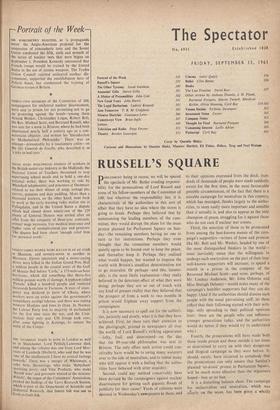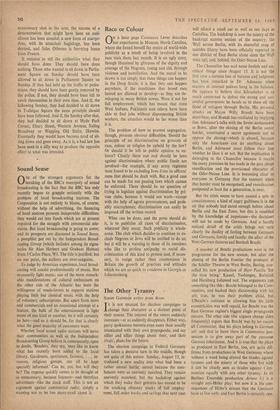RUSSELL'S SQUARE
pARLIAMENT being in recess, we will be spared the spectacle of Mr. Butler evading responsi- bility for the prosecutions of Lord Russell and some of his fellow-members of the Committee of 100; but wherever the responsibility lies, it is characteristic of the authorities in this sort of affair that they have no idea where the storm is going to break. Perhaps they believed that by summonsing the leading members of the com- mittee, they would disrupt the plans for the mass protest planned for Parliament Square on Sun- day—the remaining members having no one to turn to for instructions. Perhaps they even thought that the committee members would quietly agree to be bound over to keep the peace, and thereafter keep it. Perhaps they realised what would happen, but wanted to impress the world with Britain's steadfast determination not to go neutralist. Or perhaps—and this, lament- ably, is the most likely explanation—they really believed in the deterrent effect of what they were doing; perhaps they are so out of touch with any kind of present reality that they believed that the prospect of from a week to two months in prison would frighten away support from the campaigners.
It is now necessary to spell out for the authori- ties, patiently and slowly, what it is that they have achieved. First, let them turn their attention to the photograph, printed in newspapers all over the world, of Lord Russell's, striking appearance —lofty, frail, and determined—on the day that the 89-year-old philosopher was sent to Brixton. The only effect such action could con- ceivably have would be to swing many waverers over to the side of neutralism, and to imbue many who still oppose it with a feeling that the autho- rities have behaved with utter stupidity.
Second, could any method conceivably have been devised by the campaigners against nuclear disarmament for getting such gigantic floods of publicity for their cause? Yards of columns were devoted in Wednesday's newspapers to them, and to their opinions expressed from the dock; hun- dreds of thousands of people were made suddenly aware for the first time, in the most favourable possible circumstances, of the fact that there is a sizeable campaign for neutralism in this country, which has managed, thanks largely to the autho- rities, to seem vastly more important and sensible than it actually is, and also to appear as the only champion of peace, struggling for it against those who do not care if nuclear war comes.
Third, the selection of those to be prosecuted from among the best-known names of the cam- paign's supportirs—writers of fame and promise like Mr. Bolt and Mr. Wesker, headed by one of the most distinguished thinkers in the world— must inevitably mean that the willingness to undergo such martyrdom on the part of their less- well-known supporters will increase; to spend a month in a prison in the company of the Reverend Michael Scott—and soon, perhaps, of Mr. Lindsay Anderson, Mr. John Osborne and Miss Shelagh Delaney—would make many of the campaign's humbler supporters feel they can die happy. (And if the authorities should dismiss such people with the usual patronising sniff, let them reflect that their following started with their writ- ings, only spreading to their political opinions later; these are the people -who can influence younger generations today, and the authorities would do better if they would try to understand why.) Fourth, the prosecutions will have made both those inside prison and those outside it ten times as determined to carry on with their dangerous and illogical campaign as they were before. It, should, surely, have occurred to somebody that the prosecutions can only ensure that Sunday's planned 'sit-down' protest in Parliament Square, 'will be much more effective than the organisers hoped—ban or no ban. It is a disturbing balance sheet. The campaign for unilateralism and neutralism, which was dearly on the wane, has been given a wholly unnecessary shot in the arm; the success of a demonstration that might have been an anti- climax has been assured; a new form of martyr- dom, with its attendant hagiology, has been devised, and John Osborne is hurrying home from France.
It remains to tell the authorities what they should have done. They should have done nothing. Those who wanted to sit down in Parlia- ment Square on Sunday should have been allowed to sit down in Parliament Square on Sunday. If they had held up the traffic or pedes- trians, they should have been gently removed by the police; if not, they should have been left to catch rheumatism in their own time. And if, the following Sunday, they had decided to sit down in Trafalgar Square the same principle should have been followed. And if, the Sunday after that, they had decided to sit down at Hyde Park Corner, Ebury Street, Western Avenue, Ealing Broadway or Wapping Old Stairs, likewise. Eventually they would have become tired of sit- ting down and gone away. As it is, a bad law has been used in a silly way to produce the opposite effect to what was intended.



































 Previous page
Previous page